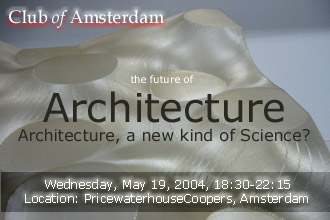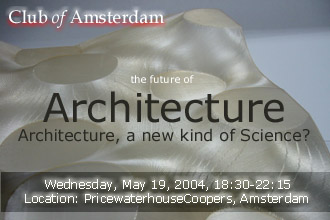|
Club of Amsterdam |
Supporters
PricewaterhouseCoopers
Surprising Switzerland
Architecture and scientific research are assimilating into a new architecture. Methods such as generative and evolutionary design are changing the way architects plan and shape the future. What does the computational paradigm bring to architecture? The Club of Amsterdam invites leading researchers and designers in this field to clarify the implication of their work.
18:30 – 19:30
Registration, drinks, snacks, networking and live music by ![]() Salvatore, the s(w)inging cook from Abbuffata!
Salvatore, the s(w)inging cook from Abbuffata!
19:30
Welcome by our Host ![]() Philippe-Marie Morel, Architect, theoretician, EZCT Architecture & Design Research, Paris
Philippe-Marie Morel, Architect, theoretician, EZCT Architecture & Design Research, Paris
19:45
Part I: The Speakers are:
![]() Jelle Feringa, Architect, researcher, EZCT Architecture & Design Research, Amsterdam
Jelle Feringa, Architect, researcher, EZCT Architecture & Design Research, Amsterdam ![]() Kas Oosterhuis, Architect, Professor, Technical University Delft
Kas Oosterhuis, Architect, Professor, Technical University Delft ![]() Ludger Hovestadt, Professor for Architecture and CAAD, ETH, Zurich
Ludger Hovestadt, Professor for Architecture and CAAD, ETH, Zurich
20:45
Coffee break
21:15
Part II: Panel with Keynote Speakers and the Challengers ![]() Flip Wegner, Partner, Eden Design & Communication
Flip Wegner, Partner, Eden Design & Communication ![]() Remko Scha, Professor for Computational Linguistics, University of Amsterdam
Remko Scha, Professor for Computational Linguistics, University of Amsterdam
and our Host ![]() Philippe-Marie Morel.
Philippe-Marie Morel.
The panel is followed by an open discussion.
|
As a partner in EZCT based in Amsterdam Jelle is focussing on the research EZCT is conducting on the relation between computation and architecture, accumulating in the upcoming publication ‘Computational Architecture’. By this research EZCT is developing a close relation to scientists in fields such as evolutionary design, cad/cam and mathematics. EZCT has held workshops at university Malaquias, Paris and more recently at the technical university Delft, and has been participating in the ‘Architecture Non Standard’ and ‘Performative Architecture’ exhibitions earlier this year. In terms of research Jelle is focussing on dissolving the computational gap between conception and production, researching an integral approach to computing architecture. |
||
|
||
|
Philippe Wegner is partner of Eden Design & Communication, a leading design consultancy in corporate and consumer identity development, communication strategy and e-media, He studied industrial design at the University of Technology in Delft and was one of the first dutch designers active in the field of user interface design. After his study he worked for six years at Philips corporate design where the merge of the physical and virtual domain was an important theme in a number of advanced development projects in which he participated. These varied from electronic workplaces to environmental control within offices by means of ubiqitous computing. Philippe also participated in the development of the Interaction Design curriculum for the Utrecht School of the Arts. Later on he lectured New Media at the Rietveld Academy and was one of the masters at the Roelof Kiers masterclass organised by the VPRO and the Berlage Institute. Subject was the exploration of the relationships between Media and Architecture. At the moment he combines Eden with lecturing at CMD (Communication & Multimedia Design) at Avans Higher Professional Education Breda. |
||

Ludger Hovestadt Ludger Hovestadt has been full professor for Architecture and CAAD since July 1, 2000 at the ETH Zurich and partner in the firm Digitales Bauen in Karlsruhe (D). |
||
|
Remko Scha studied Physical Engineering at the Technological University of Eindhoven. He managed research projects in Language Technology and Artificial Intelligence at Philips’ Research Laboratories (Eindhoven), and BBN Laboratories (Cambridge, Mass.). Currently, he is Professor of Computational Linguistics at the Institute of Logic, Language and Computation (ILLC) of the University of Amsterdam. Remko Scha has built an automatic electric guitar band (“The Machines”), designed an image generation algorithm (“Artificial”) and developed a theory about language processing (“Data-Oriented Parsing”). In the Institute of Artificial Art Amsterdam (IAAA) he collaborates with Arthur Elsenaar, Jochem van der Spek and others on algorithmic approaches to art, music and theatre. |
||
|
Architect Philippe Morel is a founding member of EZCT Architecture & Design Research. Created in 1999, EZCT is an architectural research practice formed by an international and multi-disciplinary team. Due to the ever-increasing complexity of science and technology, EZCT uses new methodologies that are defined by cross-disciplinary interactions. As such, the team established a network organization that allows specialized inputs and active involvements of outsourced theoreticians and academics. This rather unusual structure leads to an approach that considers architecture and design as a form of scientific research, as well as a part of a technological convergence process and information flux. In the field of theoretical research, Morel’s work focuses particularly on new concepts of Neuromarketing and Integral Capitalism. In the field of applied research it focuses on panelization systems based on newly defined concepts of pattern. |
||










Customer Reviews
Thanks for submitting your comment!